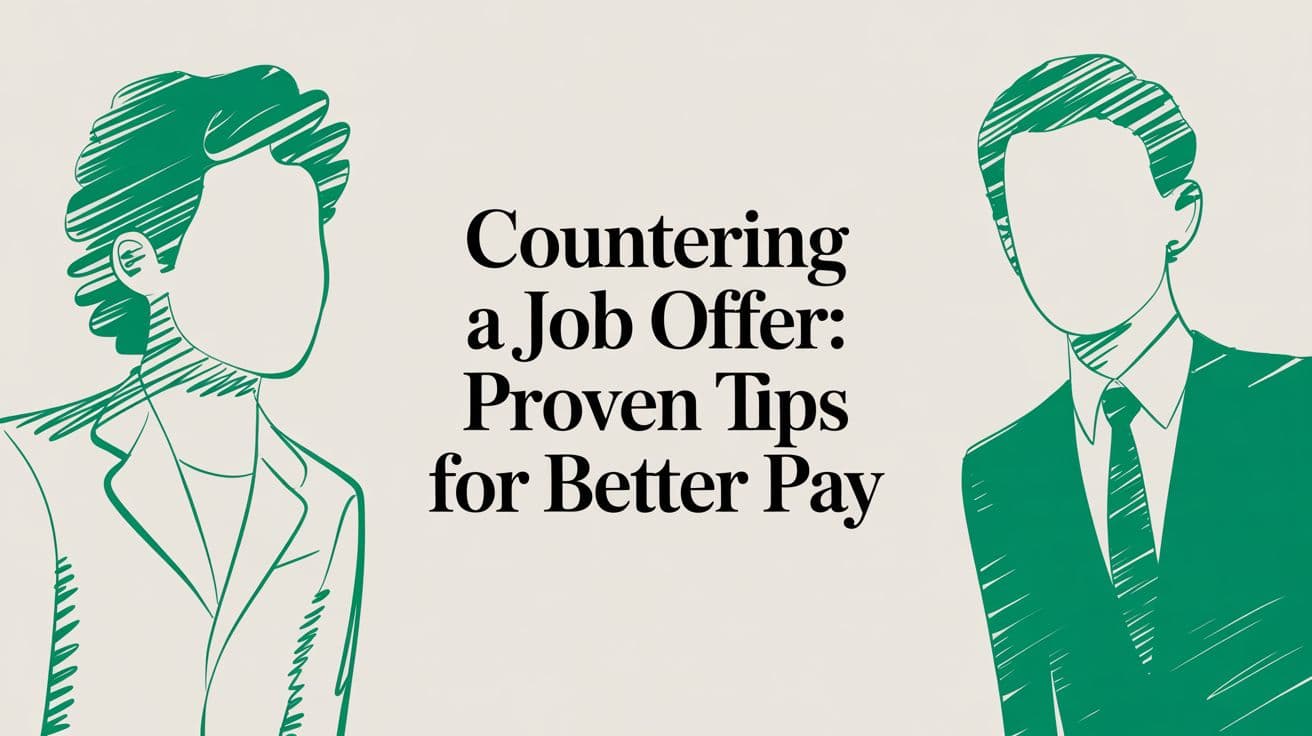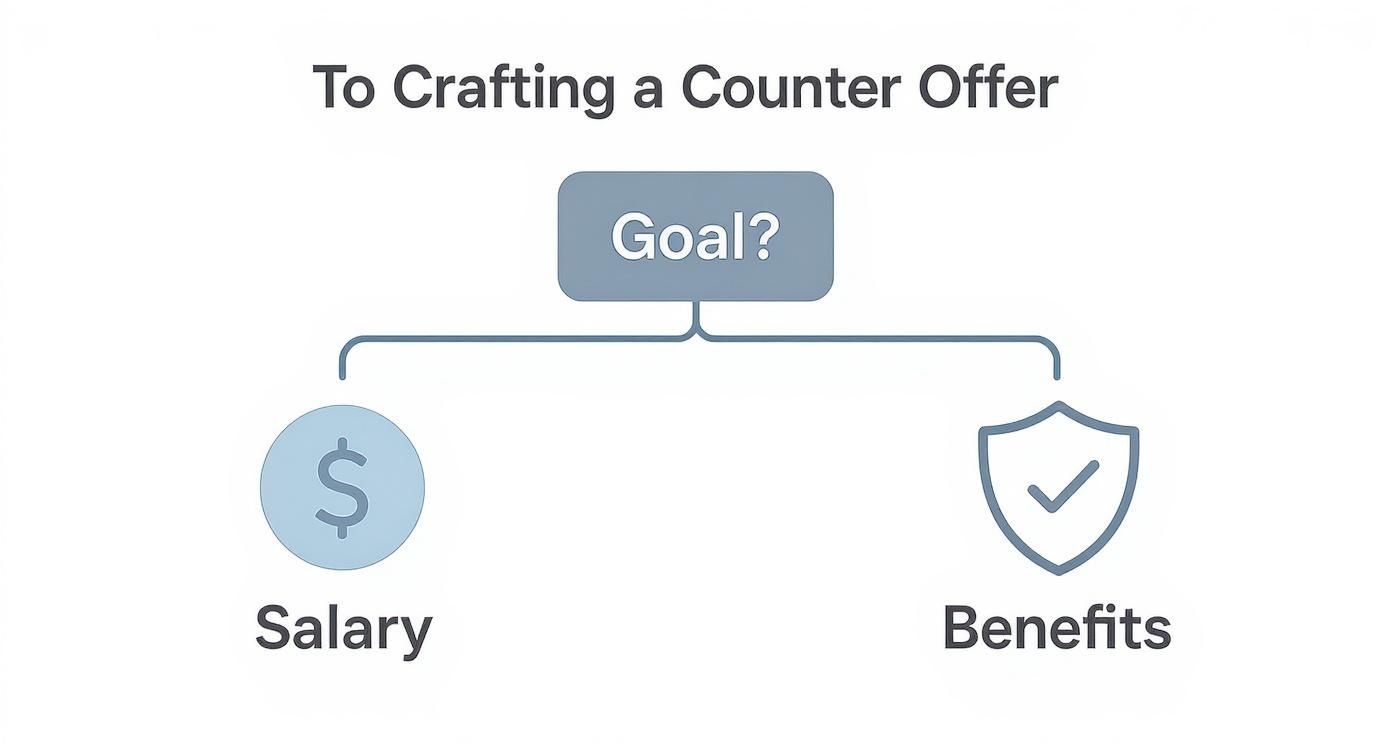Countering a Job Offer: Proven Tips for Better Pay

Countering a job offer isn't just common—it's often an expected part of the hiring dance. Think of it less like a confrontation and more like a collaborative chat about your value and where you fit into their big picture. A well-researched counter shows you’re a confident, serious professional and kicks off your relationship on the right foot.
Why You Should Almost Always Counter a Job Offer

That first offer you get? It's almost never the company's final number. It's the starting point. So many professionals I've worked with get nervous here, worrying they’ll seem greedy or, even worse, that the company might just pull the offer. The truth is, most employers fully expect top candidates to negotiate and often build that wiggle room right into the initial offer.
The key is to reframe this moment in your mind. It’s a business conversation, not a personal plea. When you come back with a counter, you aren’t being difficult. You’re simply demonstrating that you’ve done your homework and you know what your skills, experience, and the current market demand. It shows you’re a sharp professional who makes data-driven decisions.
From Confrontation to Collaboration
The objective here isn't to "win." It's to land on an agreement that works for everyone. When you frame your counter from a place of genuine excitement for the role, it completely changes the energy of the conversation. You're simply reinforcing how much you want the job while making sure the compensation reflects the value you're ready to bring.
This mindset is your best asset, especially in a job market where skilled marketers have choices. Right now, new hires are fielding an average of 3.5 job offers during their search, which is way up from 2.3 offers in the last quarter. This stat alone shows why companies are more willing than ever to negotiate to land the right person. You can dig into more of these hiring trends to get the full picture of what it takes to get hired today.
A thoughtful counter-offer isn’t just about the money. It’s your chance to get on the same page about expectations, show off your communication skills, and walk into your new role feeling genuinely valued and fired up.
At the end of the day, how you handle this negotiation sets the tone for your entire time with the company. It's your first real chance to advocate for yourself and build a professional relationship based on mutual respect and a clear understanding of your worth.
Before we dive into the specific steps, let's look at the negotiation process from a high level. I find it helps to break it down into four distinct phases, each with its own objective.
The Four Phases of Countering a Job Offer
| Phase | Key Objective | Primary Action |
|---|---|---|
| Phase 1: Analysis & Prep | Evaluate the offer against your priorities and market data. | Research salary benchmarks, list your non-negotiables, and define your "walk-away" point. |
| Phase 2: Strategy & Craft | Develop a clear, compelling case for your counter-offer. | Draft an email or script that is appreciative, data-backed, and states your specific ask. |
| Phase 3: The Conversation | Present your counter-offer professionally and confidently. | Send your email or have a live conversation with the hiring manager or HR representative. |
| Phase 4: Finalization | Navigate the employer's response and close the deal. | Handle potential pushback, evaluate a revised offer, and get the final agreement in writing. |
Understanding these stages will help you stay focused and strategic from the moment you receive the offer to the moment you accept the final terms.
How to Research and Benchmark Your Market Value

Before you even think about crafting a counter-offer, you have to do your homework. Walking into a negotiation without solid data is a surefire way to lose credibility—it’s like showing up to a client pitch with a blank deck. You need to build an objective, evidence-based case for why you’re worth what you’re about to ask for.
It all starts with a deep dive into the offer they’ve already made. Don’t just fixate on the base salary. An offer for $90,000 with fantastic healthcare and a 15% performance bonus can easily beat a $95,000 offer saddled with high-cost insurance and no bonus potential. You’ve got to see the whole picture.
Look Beyond the Base Salary
The base salary is just the headline. To truly understand what’s on the table, you need to calculate the entire total compensation package. This means adding up every single perk, benefit, and bonus to get the real number.
Here’s how to break it down:
- Variable Pay: This is your bonus and commission potential. A 10% target bonus isn't just a nice-to-have; it’s a significant chunk of your potential annual earnings.
- Equity: If the company offers stock options or RSUs (Restricted Stock Units), this can be a huge financial win down the road. Make sure you understand the vesting schedule and what the shares are currently worth.
- Benefits: This is where many people miss the real value. A great 401(k) match is basically free money—a 6% match is an instant 6% boost to your salary. You also have to factor in the real-world cost of health, dental, and vision insurance premiums.
- Perks and Allowances: Don’t write these off. That $2,000 annual learning stipend or the remote work budget is tax-free cash dedicated to your growth and well-being. It all adds up.
Getting a handle on these details is non-negotiable. If you need a refresher, this guide on what a total compensation package includes is a great place to start.
Gather Your Compensation Data
Once you’ve dissected the offer, it’s time to see how it stacks up against the market. This research is the foundation of your entire negotiation strategy. Your goal is to find reliable benchmarks for your specific role, experience level, and city. Never, ever rely on just one source.
- Industry-Specific Salary Guides: This is your best bet. Tools like SalaryGuide are built for our industry, giving you real-time, verified data for marketing and comms roles.
- Reputable Online Tools: Sites like Glassdoor and Levels.fyi are also good resources. Just be sure to filter everything by company size, location, and how recently the data was submitted to keep it relevant.
- Your Professional Network: This is an underrated goldmine. You can discreetly ask trusted mentors or peers in similar jobs for a gut check. Frame it as a question about the market, not your personal situation. For example: "Hey, I'm seeing a range between $110k and $125k for a Senior SEO Manager in Chicago. Does that feel right based on what you're seeing?"
Your research isn’t just for your own peace of mind—it’s the evidence you’ll present to the hiring manager. Frame your request around the data, not your personal budget. "The market rate for this role is X" is infinitely more powerful than "I need X to cover my bills."
Define Your Priorities and Walk-Away Point
After all this digging, you should have some real clarity. Looking at the total value of their offer and what the market data says, what does a "yes" look like for you? Is a $10,000 salary bump the only thing that matters, or would a hefty sign-on bonus and an extra week of vacation seal the deal? Get specific about what you want.
This is also the time to define your walk-away point. This is your line in the sand—the absolute minimum you’re willing to accept. Knowing this number before you start the conversation gives you the confidence to negotiate from a position of strength, not desperation. It empowers you to make a clear-headed decision if the company just can’t meet you where you need to be.
How to Word Your Counter Offer
Alright, you’ve done your homework and you know what you want. Now comes the moment of truth: turning your research and priorities into a clear, persuasive request. This is where the rubber meets the road. Remember, how you frame your counter is just as critical as what you’re asking for. The goal is to come across as collaborative and confident, not demanding.
Always, always start with genuine enthusiasm. Let them know how excited you are about the role, the team, and what the company is doing. This sets a positive tone from the get-go and reassures the hiring manager that you’re negotiating because you want the job, not because you’re on the fence.
Email or Phone Call? Choosing the Right Medium
So, should you send an email or pick up the phone? Honestly, it depends on the situation and the rapport you've built with the hiring manager. Each has its place, and sometimes a mix of both is the smartest play. For example, you could send a thoughtful email to lay out your case and then schedule a call to hash out the details live.
Here’s a quick breakdown to help you decide which channel fits your negotiation.
Email vs Phone Negotiation Scenarios
Deciding on the right communication channel is a strategic choice. An email gives you control over the message, while a phone call allows for dynamic, real-time conversation. This table outlines common scenarios and the best approach for each.
| Negotiation Scenario | Recommended Channel | Key Advantage |
|---|---|---|
| The Initial Counter | Gives you space to carefully articulate your points, include data, and lets the hiring manager review it on their own time. | |
| Complex Back-and-Forth | Phone Call | Perfect for navigating multiple variables like salary, bonus, and vacation time. You can read their tone and find solutions together. |
| A Quick Follow-Up | Phone Call | A friendly call can get a faster response and feels more personal than sending yet another email into the void. |
| Sealing the Deal | Essential. You need every single agreed-upon detail documented in writing before you officially say "yes." |
Ultimately, whether you type it or say it, the core of your message is the same: express gratitude, show excitement, make a clear ask, and back it up with solid reasoning.
How to Phrase Your Counter Offer in an Email
An email is usually the best starting point for a counter. It creates a paper trail and lets you build your case without being interrupted. Just make sure your tone is warm and professional—never aggressive.
Kick things off by thanking them again for the offer. Then, you can pivot to the negotiation. Try something like, "After carefully considering this generous offer and looking into the current market rates for a [Your Role] in [Your City], I'd love to discuss the compensation."
Here’s a simple structure for the body of your email:
- The Ask: Be direct. "Based on my research and the contributions I plan to bring to the team, I was hoping to get closer to a base salary of $115,000."
- The 'Why': Briefly tie your request to your value. "This number better reflects the industry benchmarks for someone with my background in performance marketing and my track record of increasing ROI by over 30%."
- The Next Step: End on a collaborative note. "I’m incredibly excited about this opportunity and am confident we can find a number that works for both of us. Are you free for a brief chat this week?"
If you're looking for more inspiration, checking out a few well-written counter offer letter examples can help you find wording that sounds like you.
Prepping for a Phone Negotiation
If you decide a phone call is the way to go, you have to prepare. Don't even think about winging it. Have your key talking points written down in front of you—your target salary, your absolute walk-away number, and the data that supports your position.
Pro Tip: Kick off the conversation by asking, "Is now still a good time to chat about the offer?" It’s a small gesture, but it shows you respect their time and makes sure you have their undivided attention.
Once you’re on the call, there's one crucial thing to remember: pause after you state your counter. That silence might feel a little awkward, but it's one of the most powerful tools in negotiation. It gives the other person time to think and respond, and it keeps you from immediately jumping in and talking yourself down. Be confident, stay quiet, and wait for them to speak first.
Navigating Employer Responses and Multiple Offers
You've sent your counter-offer. Now comes the hard part: waiting. How a company responds—and how quickly—can tell you a lot about their culture and just how much they want you on the team.
Brace yourself for one of three likely outcomes: they enthusiastically say "yes," they give you a firm "no," or they come back with a revised offer that meets you somewhere in the middle. Your next move is crucial, so let's walk through how to handle each one without losing your cool or the goodwill you've built.
This infographic lays out the decision-making process beautifully, whether your focus is on bumping up the salary or improving the benefits package.

As you can see, both paths start with the same foundation: solid market research and knowing what you really want before you even pick up the phone.
What to Do When They Say Yes
This is the home run you were hoping for. If they accept your terms, your first move is to express your genuine excitement and gratitude. Reiterate how thrilled you are about the role and the company, then ask about the next steps.
Your immediate priority is getting the updated offer in writing. A verbal agreement is a great sign, but it isn't official until it’s on paper.
What to Do When They Say No
Hearing a flat "no" can sting, but try not to take it personally. More often than not, it’s a reflection of their budget constraints, not your value as a candidate. This is simply a decision point. Is the original offer still good enough for you to accept?
If you’re still passionate about the job, the conversation doesn't have to end here. You can pivot gracefully. Acknowledge their position and explore other creative solutions.
You could try saying something like:
- "I completely understand the salary is firm. To help bridge that gap, would it be possible to discuss a one-time sign-on bonus?"
- "Thank you for being transparent. Given the fixed salary, could we add an extra week of vacation to the package?"
- "I really appreciate you looking into that for me. Would you be open to scheduling a formal performance and compensation review in six months?"
This approach shows you're flexible and committed to finding a win-win. It keeps the dialogue open and shifts the focus from just base pay to the entire compensation package.
How to Handle Multiple Offers
Juggling multiple offers is a fantastic problem to have, but it requires a delicate touch. You absolutely can mention a competing offer, but the key is to do it without sounding like you're delivering an ultimatum. This isn’t about sparking a bidding war; it’s about giving them important context for your negotiation.
Here's a professional way to frame it:
"I am incredibly excited about this opportunity at [Company A] and am in the process of making my final decision. I do have another competitive offer on the table, and while salary isn't my only deciding factor, their offer includes a higher base. Is there any flexibility to adjust your initial offer?"
This is honest and direct. It positions the other offer as a piece of market data, not a threat, giving them a clear reason to reconsider. It's worth remembering that the average salary increase when changing jobs is a real benchmark, and having a competing offer gives you more leverage to reach the higher end of that range.
Recruiters are more prepared for this than you might think. The US actually has the lowest offer acceptance rate in the world at just 79%, which means one out of every five candidates is pushing back or walking away. Employers know they need to be flexible to land top talent.
Finalizing the Agreement and Accepting Your Role
You’ve done the hard part. You went back and forth, made your case, and landed on a verbal agreement you feel great about. That’s a massive win, but don't pop the champagne just yet. The last and most critical piece of the puzzle is getting every single one of those negotiated details locked down in a formal, written contract.
A handshake or a "yes" over the phone is a great sign, but it’s not legally binding. It's perfectly reasonable and professional to insist on an updated, written offer letter before you give your final, official acceptance. This document isn't just a formality—it’s your proof of the agreement and protects both you and the company by making sure everyone is on the exact same page.
Review Your Updated Offer Letter
When that new offer letter hits your inbox, it's time to put on your detective hat. It’s tempting to just glance at the new salary, do a little happy dance, and sign on the dotted line, but that would be a mistake. Pull up your negotiation notes and go through the document line by line, comparing every detail.
A quick checklist can help you stay organized and make sure nothing slips through the cracks:
- Base Salary: Is the number precisely what you agreed to?
- Bonuses: Are the sign-on bonus and the performance bonus structure (e.g., 15% of base) clearly spelled out?
- Start Date: Does it match the date you discussed?
- Job Title: Is your official title correct?
- Remote/Hybrid Policy: If you negotiated specific WFH days or other flexibility, is that policy clearly written into the agreement?
- Paid Time Off: Is the number of vacation days exactly what you settled on?
If you spot any discrepancies, even minor ones, flag them right away. You don't need to make a big deal out of it; a simple, professional email will do the trick.
Something like this works perfectly: "Thanks so much for sending this over! It looks great. I just noticed the start date is listed as the 15th, but we had discussed the 22nd. Would it be possible to send over a revised version?"
Formally Accepting and Resigning
Once you have the corrected written offer in hand, you can finally accept with total confidence. A short, enthusiastic email confirming your acceptance and excitement about joining the team is all you need.
As you finalize everything, it's helpful to remember the bigger picture. The power dynamic is often more in your favor than you think. Globally, 76% of employers are reporting difficulty finding the skilled talent they need. This near-record shortage gives qualified pros real leverage. If you want to dig deeper, you can explore more data-driven insights into the 2025 hiring reality to understand these trends.
With your acceptance sent, the last moves are about professional courtesy. Let any other companies you've been interviewing with know that you've accepted another role. Then, focus on resigning from your current job with grace to keep those professional relationships strong for the future.
Got Questions? Let's Talk Counter-Offers
Even with the best preparation, stepping into a negotiation can feel a bit nerve-wracking. It’s totally normal for questions to pop up when you're in the thick of it. Let’s tackle some of the most common worries I hear from marketing pros so you can move forward with confidence.
We'll clear up the uncertainty, allowing you to focus on what really matters: getting the offer you deserve.
"Is It Risky to Counter a Job Offer?"
This is the big one, isn't it? The fear that the company will just pull the offer. But honestly, the risk is much, much lower than you think. A professionally handled counter-offer isn't just common; it's an expected part of the hiring dance for experienced roles.
Most employers actually see it as a positive sign. It shows you're a confident professional who knows your market value. The trick is to keep your tone enthusiastic and frame your request as a collaborative discussion, not a list of demands. The odds of an offer being rescinded for a polite, well-researched counter are incredibly low. If they do pull it? You might have just dodged a bullet, as that's a major red flag about their company culture.
"What Can I Negotiate Besides Salary?"
Base pay is just the tip of the iceberg. Your total compensation package is full of different levers, and almost all of them can be adjusted. If you hit a wall and the company says they have a rigid salary band for the role, pivoting to other valuable perks is a savvy move.
Think bigger picture—what would make this job a fantastic fit for your life?
- More Money, Different Ways: A one-time sign-on bonus can be a great compromise. You could also negotiate a better performance bonus structure or even ask about stock options to boost your long-term earnings.
- Better Work-Life Balance: This is huge. Don't be afraid to ask for additional vacation days, a more flexible daily schedule, or locking in a permanent remote work arrangement.
- Fueling Your Career Growth: Think about asking for a dedicated professional development budget for conferences or certifications. You could also negotiate for a more senior job title from the get-go or an earlier performance review (say, at 6 months instead of 12) to discuss future advancement.
"What if They Say the Offer Is Final?"
Okay, you hear a firm "no." Take a breath. The first thing to do is respectfully acknowledge their position. A simple, "I understand, and I appreciate you being transparent about the salary range" keeps the conversation positive and shows you're listening.
This is your cue to pivot to those non-salary items. You could try something like, "Since the salary is firm, I'd love to discuss the possibility of a sign-on bonus to help bridge the gap." If they won't budge on anything at all, you just have to circle back to your walk-away point and decide if the original offer is still the right move for you.
When an employer can't move on salary, it’s a golden opportunity to get creative. Asking for things like professional development funds or extra PTO demonstrates your long-term commitment and your desire to find a solution that works for everyone.
"How Long Should I Wait Before Countering?"
You want to act quickly, but not so fast that you seem impulsive. The sweet spot is typically one to two business days. This gives you just enough time to properly review everything, pull together your research, and write a thoughtful response.
Always, always acknowledge you received the offer within a few hours. A quick email thanking them and letting them know you'll be in touch by a specific date (e.g., "by the end of the day tomorrow") is professional, respectful, and manages their expectations perfectly.
Ready to find your market value and negotiate your next marketing role with confidence? SalaryGuide provides the real-world salary data, transparent job listings, and expert tools you need to build your case and accelerate your career. Start benchmarking your worth on SalaryGuide today.